|

photo - mw
_______________________
hide and seek from a metaphysical point of view
Roger Gathman
Limited, Inc.
(....)
The game involved an uneasy détente between the senses – the visible (hidden/not hidden) and the tactile (tagged/not tagged). We could easily come up with the semiotic wiring of the game through the putting into play of such oppositions.
We could do that. But I want to think about It. In a way, It was the most interesting figure in the whole drama. That It was called It may still be the most tremendously poetic event of my life; it is an unending source of wonder. I have read philosophers speak of the beginning of their vocation as a wonder about how things were made – how, to be more general, there was something instead of nothing – but my vocation started with the wonder of It. It seemed distilled from the adult metaphysics that papered over all the mysteries with farreaching linguistic assumptions. It rains, it happens, it is what it is, how is it out there, how is it going – that it is the old mole for true. It, in other words, is a premonition in ordinary life of what Nietzsche called the Ubermensch, and I’d really like to know if the young Fritz played hide and seek, and if the German version of the game calls the counter It.
However, It is not just about the more-than-human. It is about the transmission of negative power. It is about being the King of the Golden Bough. With one touch, an It conveys its succession. This is the origin of politics,
I think – politics begins and ends in hide and seek. ...(more)
_______________________
Stefan George, "The Man and the Faun"
From Das neue Reich (1928)
Justin Erik Halldór Smith
(....)
The Man
You poisonous fiend with crooked mouth
In spite of your misshapenness you are too close
To us • otherwise you would get to know my weapon ..
The Faun
The beast knows no shame the man no thanks.
With all the arts you still never learn
What you most need .. but we still serve.
So hear just this: wiping us out, you erase yourselves.
Where our tufts grow alone comes milk
Where our hooves kick not there grows no straw.
If your spirit alone had been at work: if long ago
Your beat had been muffled with all you had done
Your wood had withered and your crops gone to seed ..
Only by magic does life stay awake.
...(more)
_______________________
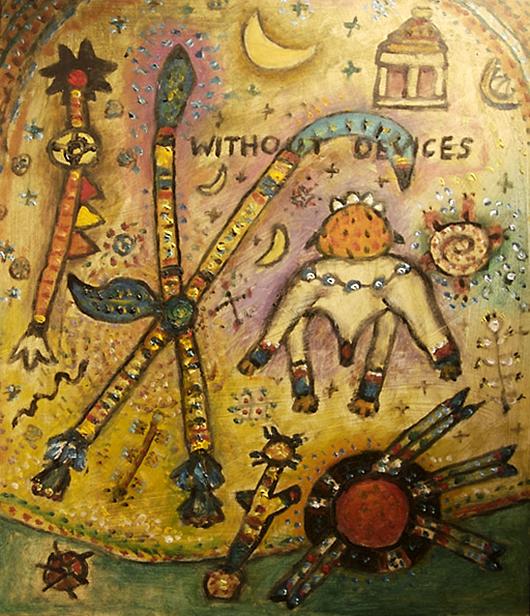
Without Devices
Alan Davie
_______________________
Poems
Max Wallis
II Inside
Press your face into the small doorway and feel how the wood bends to meet you, to fit you in and your whole head, yes, even your head, will slip into the space. You'll see the sun. Men with nets, electrified, hauling in the spread of day. There'll be flares that women chase with scooters made of the whitest material ever seen. If you watch them long enough the image will shift and they'll take long hooped rods and tie up the plasma of the raw star and blow them like glass into tubes, vases, jars, glowing with the entire stretch of the rainbow. Sunspots will shift beneath the flying carousel of people. If you observe them long enough they'll turn to you, winking, as they bottle the dawn into vials. Stay long enough and you will become one of them.
...(more)
Stride Magazine_______________________

Alan Davie
b. September 28, 1920
Saxophonist and journeyman translucent
Davie is (arguably) Scotland’s greatest living artist. He’s the daddy of that most self-effacing and denialist of movements, the Scottish beats. From Davie, a freeform (of course) line of nationalist abstraction and dissent can be traced through his influence on the work of Alisdair Gray, John Bellany, Craigie Aitchison, Christopher Wood and Lorraine G Huber. Not that Davie would ever recognise such art history heresy: ‘I’ve always seen myself as being a complete outsider. I’ve never been part of a group or movement.’ He told me recently, when he took some rare time out his studio to answer a few questions for The List.
—
The Creative World of Alan Davie
_______________________
“Excentriques, Ex-centric, Avant-Garde: Women and Modernism in the Literatures of Canada”
Barbara Godard.
A Room of One's Own 8, 4 (Fall, 1984): 57-75.
available at Lemon Hound
_______________________
Lamenting the Modern: On Zadie Smith’s NW
K. Thomas Kahn
(....)Although her prose owes much to the modernist school and her structure to the postmodernist dissection of time and identity, Smith continually returns to “the modern” as a continuum: “At some point we became aware of being ‘modern,’ of changing fast. Of coming after just now. John Donne was also a modern and surely saw change but we feel we are more modern and that the change is faster. Even the immutable is faster. Even blossom.” As we witness Leah swallowing her pride and working for a charity despite her university degree, rendered moot in the economy; as we witness Natalie rising as a barrister despite her class status and in spite of an ambivalence she can never wholly express, one which she tries to correct or mask through motherhood; and as we witness how these women relate to the men in their lives (whether central or tangential), we are left with the sense that, like Anna in Doris Lessing’s The Golden Notebook, modernity wreaks havoc on individuals’ conceptualizations of their own identities....(more)
_______________________

photo - mw
_______________________

photo - mw
_______________________
an excerpt from The Passion According to G.H. by Clarice Lispector
translated from the Portuguese by Idra Novey
(....)
How to explain, except that something I don’t understand was happening. What did she want, that woman who is me? what was happening to a G. H. on the leather of her suitcases?
Nothing, nothing, only that my nerves were now awake—my nerves that had been calm or simply arranged? had my silence been a silence or a high mute voice?
How can I explain it to you: suddenly the whole world that was me shriveled up in fatigue, I could no longer bear on my shoulders—what?—and was succumbing to a tension that I didn’t know had always been mine. They were already starting, and I still didn’t realize it, the first signs inside me of a landslide, of underground limestone caves, collapsing beneath the weight of stratified archeological layers—and the weight of the first landslide was bringing down the corners of my mouth, making my arms fall. What was happening to me? I’ll never understand but there must be someone who understands. And it’s inside myself that I must create that someone who will understand.
And though I’d gone into the room, I seemed to have gone into nothing. Even once inside it, I was still somehow outside. As if the room weren’t deep enough to hold me and I had to leave pieces of myself in the hallway, in the worst rejection to which I’d ever fallen victim: I didn’t fit.
...(more)
_______________________
Four Poems
Benjamin Landry
conjunctions

Standard balloon construction: this frailty
we thought would hold against however many
decibels, whatever category storms,
although we watched cul-de-sacs
bloom overnight, concrete slabs like a river icing up
followed by pilings, joists, studs, a false canopy.
...(more)
_______________________
No, he is not a real teacher. He hasn't the strength of a Socrates, who always stayed with his interlocutor, demanding total understanding and agreement from his partner at each step of the way.
Socrates led his interlocutors to the moment of crisis, when they were overcome by discouragement, and wanted to break off the discussion. And then - the miracle - Socrates would assume their doubt and discouragement himself. He would take on all the dangers of inquiry.
Socrates's interlocutor comes, in the moment of crisis, to identify himself with Socrates. At the moment of greatest uncertainty, when his whole system of values seems to him without sure resting place, he chooses to become as Socrates is: the one who is certain only that he knows nothing.
At the end of the discussion, Socrates's interlocutor learned, it seems, only the limits of his understanding. He feels confusion as his whole value-system is turned upside down. His prior sense of security and self-identity has gone. He is alone, without place, without old comforts. But hasn't he also learnt what true thinking is? Hasn't he found himself in the position of Socrates himself?
—
Wittgenstein Jr
_______________________

photo - mw
_______________________
“Dismiss Whatever Insults Your Own Soul”
A Crucible of Political Disenchantment
Phil Rockstroh
(....)
Despite all the cultural cues that we have internalized, one cannot consume, medicate, buy on credit, receive a promotion, vacation, vote, hope, affect a pose of hipster irony, tithe to the church of your choice, receive a hundred FaceBook friendship requests, hit the winning lottery number, support the troops, nor be the recipient of a VIP swag bag in order to stumble your way back to possessing a sense of control and power.
All too often, we incarcerate ourselves in a prison of expectation — expectation forged and constructed by the material of past events, both traumatic and triumphant. We mistake this prison for the whole of ourselves and for the sweep and detail of the world. We go through life convinced our agendas are our own, rarely pondering what circumstances and experiences formed our perceptions. Are my goals and convictions my own, or have those notions been foisted on me by forces of dehumanizing power?
Daily, power kicks us in the gut, and demands our gratitude for having done so, even terms us deviant when we cry out in pain or we rage from within the confines of our powerlessness.
There exist billions of us who feel this way. Multitudes feeling alone among lonely multitudes.
What keeps us from grasping our common plight? ...(more)
_______________________
Reactivating the Social Body in Insurrectionary Times
Interview with 'Bifo'
(....)
I am not a reactionary, nor am I a nostalgic person who wants to go back to a time of low-??tech communication. The technological struggle is part of a living body of society but the problem is that during the last twenty years, the social conditions, new technologies have also cancelled or obscured the possibility of a bodily relationship between social beings. In one sense, social networking and social media technologies have been useful in calling bodies to the street but this dynamic of virtual embodiment has to be reactivated from the point of view of the body, of eroticism, of social relationships. I don’t want to suggest that we should forget about new technology, but rather that we have to inscribe these technologies within a new bodily relationship to each other in physical space, not only in virtual space....(more)
Critical Legal ThinkingLaw & the Political via I cite
_______________________

photo - mw
_______________________
From Eye of Witness (4): The Nature Theater of Oklahoma (revisited)
Jerome Rothenberg
6
“you are a bear” she said
& he became
a bear, he wore it
like his skin
the lost look
the interior grace
that surfaced on him,
he was faceless too
& walked inside
his footsteps half
an animal who loves
his other half,
the silence of the moon
over his head,
this is the mark the man’s arm
scribbles, darkly,
on the cave wall,
in the cave,
in oklahoma
...(more)

photo - mw
_______________________
Another World:
David Graeber interviewed by Michelle Kuo
Artforum - free reg. req.
The idea that alienation is a bad thing is a modernist problem. Most philosophical movements—and, by extension, social movements—actually embrace alienation. You’re trying to achieve a state of alienation. That’s the ideal if you’re a Buddhist or an early Christian, for example; alienation is a sign that you understand something about the reality of the world.
So perhaps what’s new with modernity is that people feel they shouldn’t be alienated. Colin Campbell wrote a book called The Romantic Ethic and the Spirit of Modern Consumerism [1987], in which he argued that modernity has introduced a genuinely new form of hedonism. Hedonism is no longer just getting the sex, drugs, and rock ’n’ roll or whatever but it’s become a matter of selling new fantasies so that you’re always imagining the thing you want. The object of desire is just an excuse, a pretext, and that’s why you’re always disappointed when you get it.
Campbell’s argument makes total sense when you first read it. But in fact, again, it’s backward. If you look at history—at, say, medieval theories of desire—it’s utterly assumed that what you desire is—
MK: God.
DG: Or courtly love, yes. But whatever it ultimately is, the idea that by seizing the object of your desire you would resolve the issue was actually considered a symptom of melancholia. The fantasies themselves are the realization of desire. So by that logic, what Campbell describes is not a new idea. What’s actually new is the notion that you should be able to resolve desire by attaining the object. Perhaps what’s new is the fact that we think there’s something wrong with alienation, not that we experience it. By most medieval perspectives, our entire civilization is thus really a form of clinical depression. [laughter]
_______________________

Mark Rothko
b. September 25, 1903
_______________________
... your average Pinterest board or inspiration Tumblr basically functions as a longing machine.
Pinterest, Tumblr and the Trouble With ‘Curation’
CARINA CHOCANO
Once the exclusive province of advertising art directors, designers and teenage girls in boarding-school dormitories, mood boards and their electronic equivalents have exploded online. Not just on Pinterest, but also in the form of dopamine-boosting street-fashion blogs and cryptically named Tumblr blogs devoted to the wordless and explanation-free juxtaposition of, say, cupcakes and teapots and shoes with shots of starched shirts and J.F.K....(more)
_______________________
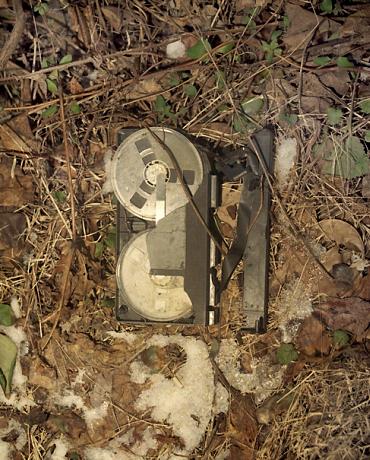 Swamp Thing
Bryan Graf
via
_______________________
Infinitely More Than Nothing
Astra Taylor
(....)
Occupy Wall Street burst onto the scene like nothing before it, or at least nothing I've ever known. In the months leading up to the occupation, protests were a virtual, vicarious experience for most of us. We watched tweets stream in from Iran or tuned into Al Jazeera as demonstrators flooded Tahrir Square. We saw tens of thousands of people take over the Wisconsin capital. The world (and one exceptional American state) was in revolt, yet the rest of the country, and New York City in particular, felt as complacent as ever. An early and profound success of Occupy was breaking that sense of complacency. A few weeks ago a friend told me that they have been less depressed since Occupy Wall Street started, and I nodded, saying I understood. Just knowing other people are outraged is a kind of tonic.
Still, Occupy always aimed for far more than just making a few sensitive souls feel less alone. It aspires, ambitiously and uncompromisingly, to the complete transformation of our society and the principles that guide it. By that impossibly high standard, Occupy has been a rather spectacular failure. And yet here I am, a year later, more involved in the day to day of the movement than I was at its apex last autumn. I see more potential in what Occupy has sparked than I did on the first day.
When I share this fact with people they often pause, a bit conflicted or confused. Many believe that Occupy is over—squelched by the police or run out of steam—and thus wonder how I can be part of a movement that no longer exists? Others have been persuaded by the mainstream news media that Occupy was little more than a clueless uprising of malcontents or quasi-criminals—not something, in other words, that I should be shamelessly declaring my affinity for (these people may have seen the ads bashing Elizabeth Warren that paint occupiers as undesirables who "attack police, do drugs and trash public parks," or watched the preview for Andrew Breitbart's posthumous documentary Occupy Unmasked, or simply read the New York Times or Huffington Post on an off day.) A third group seems subtly dismayed when I speak of my continuing work with Occupy. These are typically change-loving liberals who, for some reason or another, never got involved in the protests against Wall Street. The sight of people in the streets was inspiring to them but also, it seems, slightly irritating, a source of imagined recrimination. They wouldn't mind if the protests were finished, and with it the sense of being guilted and goaded by the knowledge that others are taking action.
Faced with these reactions, talking to acquaintances about Occupy Wall Street often leaves me with mixed emotions. ...(more)
Beyond The Choir
a forum for grassroots mobilization
via I cite
_______________________
Monopolizing War?
Tom Engelhardt
War has become a sort of American monopoly--but the American people don't seem to know, or care.
(....)
War: it’s what we do the most and attend to the least. It’s a nasty combination....(more)
_______________________
Chockadoc
A Catalog of Online Documentaries
_______________________

photo - mw
_______________________
The Place of Love
Robert Kelly & Contemporary American Poetry
Jordan Reynolds
rain taxi
 detail
Jiri Kolar
b. September 24, 1914
_______________________
"To Elsie"
or
"The pure products of America / go crazy"
William Carlos Williams
The pure products of America
go crazy--
mountain folk from Kentucky
or the ribbed north end of
Jersey
with its isolate lakes and
valleys, its deaf-mutes, thieves
old names
and promiscuity between
devil-may-care men who have taken
to railroading
out of sheer lust of adventure--
(....)
while the imagination strains
after deer
going by fields of goldenrod in
the stifling heat of September
somehow
it seems to destroy us
It is only in isolate flecks that
something
is given off
No one
to witness
and adjust, no one to drive the car
...(more)
_______________________

Steam cathedral
Studiolum
Poemas del rķo Wang
_______________________
What’s the big idea?
David Armitage
In many realms of historical writing, big is back. In some areas – historical archaeology, comparative sociology or world-systems theory – it never went away. In others, it clearly has disappeared, never to return: the globe-spanning universal histories associated with an Oswald Spengler or an Arnold Toynbee seem unlikely to be imitated again. But across the historical profession, the telescope rather than the microscope is increasingly the preferred instrument of examination. A tight focus has hardly been abandoned, as the continuing popularity of biography and the utility of microhistory both amply show. However, it is being supplemented by broad panoramas of both space and time displayed under various names: “world history”, “deep history” and “big history”. This return to the longue durée presents challenges and opportunities for all historians, including practitioners of intellectual history....(more)
_______________________
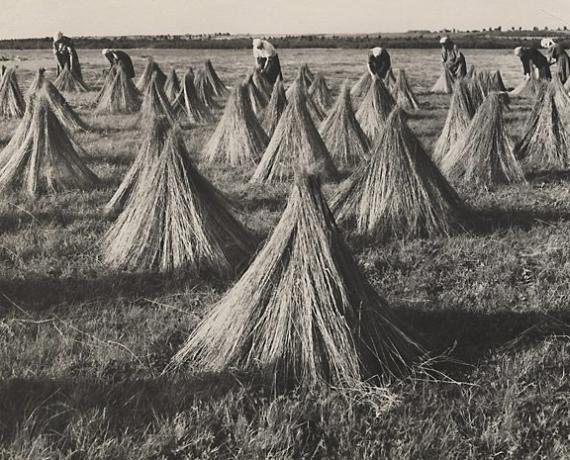
Olga Lander
1930s
From Pictorialism And Avant-Garde To Socialist Realism
Nailya Alexander Galleryvia
_______________________
... our reply to the worried progressive liberals, eager to join the revolution, and just not seeing its chances anywhere around, should be like the answer to the proverbial ecologist worried about the prospect of catastrophy: don't worry, the catastrophy will arrive…
Slavoj Zizek
In his Notes Towards a Definition of Culture, the great conservative T.S. Eliot remarked that there are moments when the only choice is the one between heresy and non-belief, that is to say, when the only way to keep a religion alive is to perform a sectarian split from its main corpse. This is our position today with regard to liberal democracy: only a new “heresy” (represented by the radical Left) can save what is worth saving in liberal democracy: democracy, trust in people, egalitarian solidarity… The only alternative is “capitalism with Asian values” (which, of course, has nothing to do with Asia, but all with the clear and present tendency of contemporary capitalism to suspend democracy)....(more)
_______________________
The Unifying Element in All Struggles Against Capital Is the Right of Everyone to Full Human Development
Michael A. Lebowitz
Monthly Review
(....)
Much of what I have stressed is the way people transform themselves through their activity. That is where social movements are absolutely critical. Because in social movements people transform themselves and they make themselves into different people. That’s what Marx says in a number of places. What he says is, “well, of course, wage struggle is not going to change things. But if workers were to give up the wage struggle, they would demonstrate that they would not be capable of anything larger.” Because it is only in that struggle that they make themselves fit to create a new society. Well, that’s the wage struggle. But it is true of every struggle. In every struggle, you are transforming yourself and making yourself fit, not only individually but also collectively.
(....)
One of the central measures that has to be part of a struggle for building a socialist alternative is the struggle to expand the commons. What does neoliberalism, what does capitalism, do? Its whole focus is to commodify everything. Health care—commodify it. Schools—commodify them. Commodify everything. So what is the alternative for human beings trying to develop their potential? Decommodify everything and bring things under control. Of course, when you talk about decommodifing and about expanding the commons, the immediate question that comes up is “well we all know about the ‘tragedy of the commons’ so if we have everything free and available to people then it just leads to absolute tragedy.” Well, there’s no truth to that. Communities have managed common resources all the time. But the key element is community. You have to have a local community that is effective, one that can monitor the commons. In short, I argue that social movements and all movements to remove the power of capital can unite on one common point—the right of everybody for full human development. That’s the goal in the Communist Manifesto—the free development of each is the condition for the free development of all....(more)
_______________________
The Age of Big Data and the Death of Theory
Piero Scaruffi
The Institute for Ethics and Emerging Technologies
_______________________
 Jiri Kolar
_______________________
The new, improved lemonhound.com is up & barking.
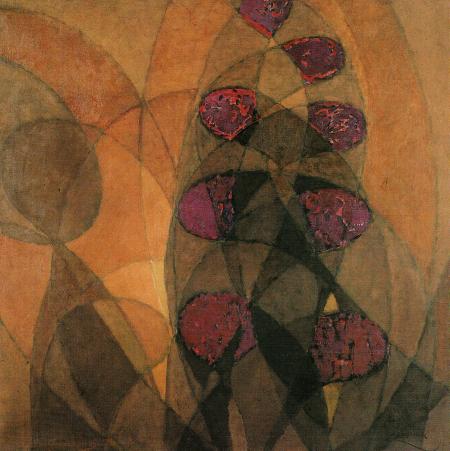
Warm Chromatics
1912
Frantisek Kupka
b. September 23, 1871
_______________________
The Personal History Of Wind
Jennifer Denrow
octopus magazine
In the personal history of wind, there is this. Beyond this, there is all of the time. Even in winter, even in the reliable snow we watch the sky break. And then the helicopter. The aphrodisiacs and geese. I pick up what’s near us: three horses, stable between trees. I don’t memorize their manes.
The mascots in wind blow away. Our parliaments settle into our laps. In a long river, I row three people home. They shoot me with water guns and tell me to hurry. The animals are next to us with their incredible lives.
I don’t mind the way time is or the appearance of clouds. I put everything together and memorize it. When the world returns I swim out and back in a fit of loneliness. I go to the meadow where the wind has collapsed.
...(more)
_______________________
Always the Same Snow and Always the Same Uncle
Herta Müller
Translated from German by Philip Boehm
words without borders
(....)
I don’t trust language. I know by my own example best of all that in order to be accurate, language must always take something that doesn’t belong to it. I don’t know why verbal images are so thievish, why even the most valid comparison steals characteristics that are not properly its own. Only when one perception robs the other, when one object seizes the substance of another and claims it for its own and uses it—only when what cannot happen in reality becomes plausible in a sentence, only then can the sentence stand up to reality with a reality of its own, a reality subsumed into the word and valid as such....(more)
_______________________
Language as Gameplay:
toward a vocabulary for describing works of electronic literature
Brian Kim Stefans
Electronic Book Review
abstract
Just as Walter Benjamin declared that all "great works of literature either dissolve a genre or invent one," Brian Kim Stefans argues that all successful works of electronic literature are sui generis and invent their own genre. There can be a vocabulary for this invention, however, and Stefans sets out “The Holy Grails of Electronic Literature,” “Six Varieties of Crisis,” and the “Surrealist Fortune Cookie.” Through these concepts, he describes the formal challenges, reading experiences, and fundamental textual units of electronic literature.
_______________________
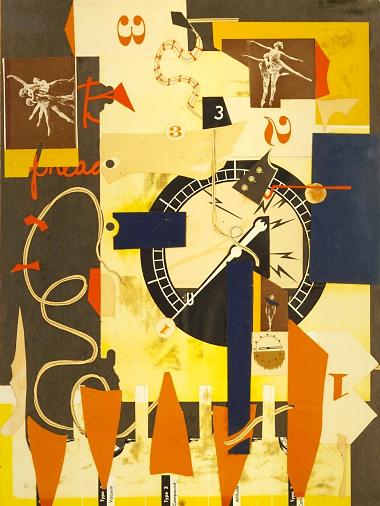
Esphyr Slobodkina
b. September 22, 1908
_______________________
Doc Searls
I want to drive on the Web, but instead I’m being driven. All of us are. And that’s a problem.
It’s not for lack of trying on the part of websites and services such as search engines. But they don’t make cars. They make stores and utilities that try to be personal, but aren’t, and never can be.
(....)
The main problem is that browsers are antique vehicles.
(....)
See, we need to drive, and browsers aren’t cars. They’re shopping carts that shape-shift with every site we visit. They are optimized for being inside websites, not for driving outside them, or between them. In fact, we can hardly imagine the Net or the Web as a space that’s larger than the sites in it. But we need to do that if we’re going to start designing means of self-transport that transcend the limitations of browsing and browsers.
Think about what it means to drive. The cabin, steering wheel, pedals, controls, engine, tires and chassis of a car are all controlled by you. The world through which you move is outside, not inside. Even in malls, you park outside the stores. The stores do not intrude inside your personal space. Driving is no less personal and no less masterfully yours when you ride a bike or a motorcycle, or pilot a plane. Those are all personal vehicles too. A browser should have been like one of those, and that was kind of the idea back in the early days when we talked about “surfing” and the “information highway.” But it didn’t turn out that way. Instead browsers became shopping carts that get fresh skins at every website.
We need a new vehicle. One that’s ours....(more)
_______________________
Martin Amis, Redux
Robert Birnbaum
Our man in Boston sits down with Martin Amis for their sixth chat to discuss Nabokov, dictionaries, spiteful reviews, the death of Christopher Hitchens, and the freedom of writing fiction.
(....)
RB: I read you quoted as claiming that one’s vocabulary shrinks as one gets older.
MA: Yes, that’s just a fact.
RB: How was that determined?
MA: It’s just a fact. Ah, there are horrible statistics to show it. (Both laugh). But I have always been a great user of dictionaries, and thesauruses as well. People get the wrong idea about a novelist and the thesaurus. You are not looking for words like “sinecure.” What you are looking for, most of the time, is a synonym that scans differently. So you need a three-syllable synonym, or one that doesn’t end in “-ation.” It’s just for the euphony. Um, but the COD [Concise Oxford Dictionary] is all you need. You look up a word, maybe a word you know perfectly well, and you see what it’s origin was, and that word is now stamped. It’s your word. And every time I do it, if feels like a gray cell has been born in my head; instead of going out, it’s coming in....(more)
_______________________
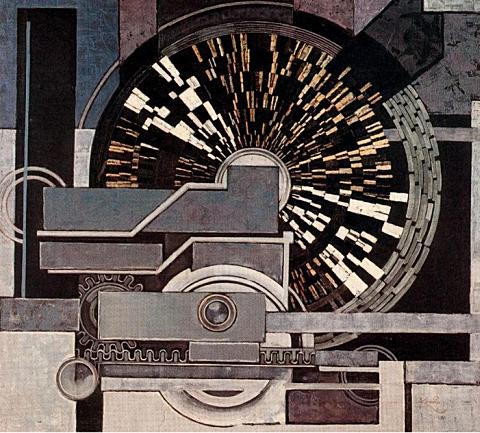 music
Frantisek Kupka
_______________________
An Interview with Joshua Corey
wave composition
(....)
I’m interested in older poetic forms in an almost Benjaminian sense, as artifacts that have outlived their world, which when resurrected Frankenstein-style bring certain utopian resonances as well as modes of critique to bear.
(....)
Politics, or the complex zone of political intention, is fair game for poetry in terms of content, I feel. Much of the poetry that concerns me most closely is political not in any oblique quasi-structuralist Language-poetry sense but in terms of its subject matter. I’m very engaged with post-pastoral writing and ecopoetics, which is an intrinsically political force field of topics, vectors, and fantasies. More and more, what interests me about poems is the intensity of the desire they manifest: I think the reason I gravitate toward pastoral rather than ecopoetics proper is because pastoral manifests a zone in which contradictory intensities work themselves out: it’s a ground for fantasy, it’s Robert Duncan’s meadow of first permission. So I’m less interested than I once was in a Jamesonian poetry of cognitive mapping of the spatiality of late capitalism and more interested in a poetic politics akin to that practiced by Duncan, who preached obedience to what’s happening in the poem. The poem can and should include everything, including everything political, but it doesn’t need to orient toward critique or action—and how foolish if it did, there’s a million better ways to perform critique or take political action than by writing a poem. Still, our politics is spun out of what we can imagine, so poems that imagine new modes of being—with others and with the others in the self—may have, indirectly, a good deal of political work to do....(more)
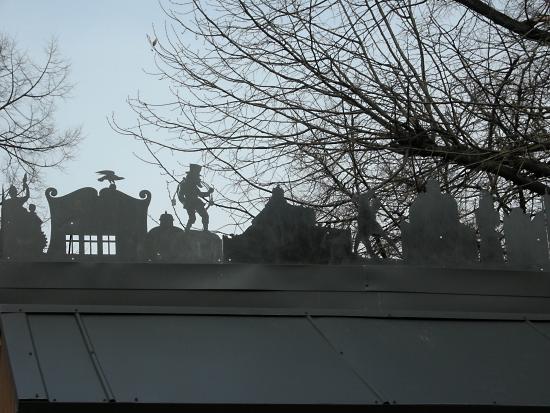
To go to Lwów
Studiolum
Poemas del rķo Wang
To go to Lwów
Adam Zagajewski
translated by Renata Gorczynski
(....)
... But only if Lwów exists,
if it is to be found within the frontiers and not just
in my new passport, if lances of trees
—of poplar and ash—still breathe aloud
like Indians, and if streams mumble
their dark Esperanto, and grass snakes like soft signs
in the Russian language disappear
into thickets. To pack and set off, to leave
without a trace, at noon, to vanish
like fainting maidens. And burdocks, green
armies of burdocks, and below, under the canvas
of a Venetian café, the snails converse
about eternity. ...
...(more)
_______________________
Names who are strangers out of bounds of the bound margin: I thought one way to write about a loved author would be to follow what trails he follows through words of others: what if these penciled single double and triple scorings arrows short phrases angry outbursts crosses cryptic ciphers sudden enthusiasms mysterious erasures have come to find you too, here again, now.
—
Susan Howe, out of “Melville’s Marginalia” (The Nonconformist's Memorial, 1993) Arrow
another fine assemblage by John Latta
_______________________
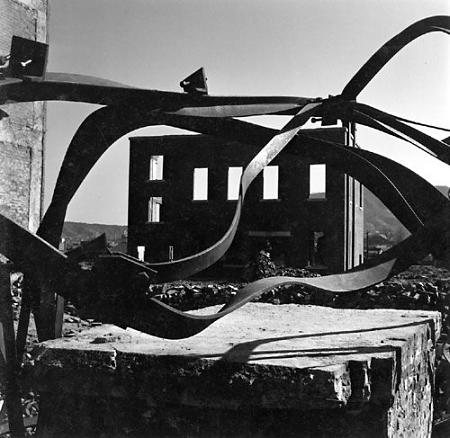
Josef Breitenbach
_______________________
The Hidden Progressive History of Income Tax
The income tax was the most popular economic justice movement of the early 20th century. What happened?
Erik Loomis
_______________________
The 47 percent
Roger Gathman
(....)
In the beginning, economics was tugged between Smith’s optimism and Ricardo’s pessimism – between the notion that the market would take the place of the monarchs and prime ministers in that neat little history of the progress of mankind, worked out by the Edinburgh philosophes, on the one hand, and the worry that the winner take all nature of the market, plus Malthusian constraints of our restricted supply of natural resources, would doom us to an increasingly immiserated working class, a pampered and overcompensated upper class, and a world of busts. As Marx saw, quite accurately, the same internal dynamic that drove capitalism to produce affluence drove it to periodically collapse in the midst of its products, helpless to utilize them. Unless this system were overturned, we were inevitably headed to the world of Wells’ Time Traveler, where “the queer little ape-like figures” of the working class Morlocks kept up the world of the haves, pursuing pleasure and comfort and beauty like Bloomsbury eternalized – the Eloi, the elect.
Of course that didn’t happen, or hasn’t yet. One could say that the Morlocks have just been moved out of the gated community countries into the ghettoized, but that would still not be quite right – besides which, it would transform Marx’s precise notion of the relations between the working class and the bourgeoisie into almost any two-fold conflict. No, life more abundant was wrung out of the capitalist system by the workers through unionization and, not least, the threat of communism, and it took a long time, and involved the full use of the countervailing powers of the state, which was put in the unaccustomed position of actually operating, seemingly, against the interests of the corporations. This short interval has long closed, but the corporations find it useful to keep up the pretense that the state and private enterprise are matched in deadly combat, with all the other nonsense about our pious preference for a smaller scale of the state. But the long march to abundance took enough time that the system not only assimilated the greater purchasing power of the working class but learned to exploit it. And then, of course, inevitably, manufacturing began, in the U.S., to follow agriculture in the train of obsolete sectors. Or, more precisely, just as the Great depression was about the shrinking of the agricultural dependent population and the final displacement of rural America, the Reagan years – which we still live in – are about the shrinking of the manufacturing sector and the final displacement of Rust belt America. ...(more)
_______________________
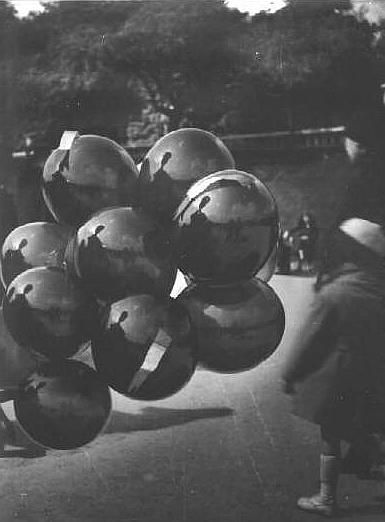
Child With Balloons
Luxembourg Gardens, Paris
1933-39
Josef Breitenbach
1896 - 1984
1 2
_______________________
Pedagogy of the Oppressed
Paulo Freire
b. September 19, 1921
Translated by Myra Bergman Ramos
The central problem is this: How can the oppressed, as divided, unauthentic beings, participate in developing the pedagogy of their liberation? Only as they discover themselves to be “hosts” of the oppressor can they contribute to the midwifery of their liberating pedagogy. As long as they live in the duality in which to be is to be like, and to be like is to be like the oppressor, this contribution is impossible. The pedagogy of the oppressed is an instrument for their critical discovery that both they and their oppressors are manifestations of dehumanization.
Liberation is thus a childbirth, and a painful one. The man or woman who emerges is a new person, viable only as the oppressor-oppressed contradiction is superseded by the humanization of all people. Or to put it another way the solution of this contradiction is born in the labor which brings into the world this new being: no longer oppressor nor longer oppressed, but human in the process of achieving freedom.
This solution cannot be achieved in idealistic terms. In order for the oppressed to be able to wage the struggle for their liberation they must perceive the reality of oppression not as a closed world from which there is no exit, but as a limiting situation which they can transform. This perception is a necessary but not a sufficient condition for liberation; it must become the motivating force for liberating action. Nor does the discovery by the oppressed that they exist in dialectical relationship to the oppressor, as his antithesis that without them the oppressor could not exist — in itself constitute liberation. The oppressed can overcome the contradiction in which they are caught only when this perception enlists them in the struggle to free themselves.
We make the road by walking: conversations on education and social change
Myles Horton, Paulo Freire google books
_______________________
Promoting Social Mobility
James J. Heckman
Boston Review forum
_______________________
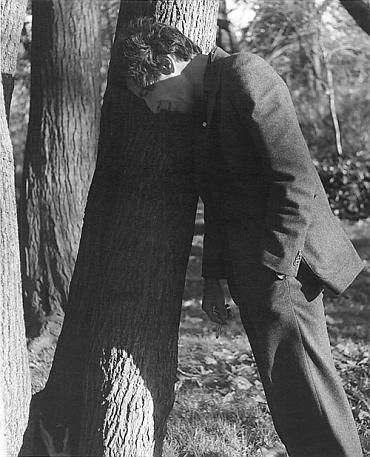
Leonard Cohen
b. Sep 21, 1934
photo - David Boswell
_______________________
The reason why I do not spend my days in despair and my nights in hopeless weeping simply is that I am in love with my own ruin. I therefore deserve no sympathy, and probably shan’t get it: my own profound self-compassion is enough. I am so abominably self-conscious that no smallest detail in this tragedy eludes me. Day after day I sit in the theatre of my own life and watch the drama of my own history proceeding to its close.
(...)
Sometimes, as I lean over a five-barred gate or gaze stupidly into the fire, I garner a bitter-sweet contentment in making ideal reconstructions of my life, selecting my parents, the date and place of my birth, my gifts, my education, my mentors and what portions out of the infinity of knowledge shall gain a place within my mind - that sacred glebe-land to be zealously preserved and enthusiastically cultivated. Whereas, my mind is now a wilderness in which all kinds of useless growths have found an ineradicable foothold. - W. N. P. Barbellion, December 20, 1916
The Complete Works of W. N. P. Barbellion
courtesy of Ray Davis
_______________________
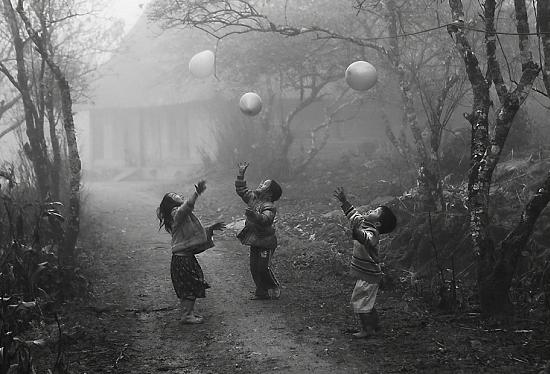
Vo Anh Kiet
_______________________
Losing My Revolution:
How Many Resources Shared on Social Media Have Been Lost?
Hany M. SalahEldeen, Michael L. Nelson
abstract
Social media content has grown exponentially in the recent years and the role of social media has evolved from just narrating life events to actually shaping them. In this paper we explore how many resources shared in social media are still available on the live web or in public web archives. By analyzing six different event-centric datasets of resources shared in social media in the period from June 2009 to March 2012, we found about 11% lost and 20% archived after just a year and an average of 27% lost and 41% archived after two and a half years. Furthermore, we found a nearly linear relationship between time of sharing of the resource and the percentage lost, with a slightly less linear relationship between time of sharing and archiving coverage of the resource. From this model we conclude that after the first year of publishing, nearly 11% of shared resources will be lost and after that we will continue to lose 0.02% per day.
arXiv.org e-Print archive
_______________________
Alone in the Woods
Stevie Smith
b. September 20, 1902
Alone in the woods I felt
The bitter hostility of the sky and the trees
Nature has taught her creatures to hate
Man that fusses and fumes
Unquiet man
As the sap rises in the trees
As the sap paints the trees a violent green
So rises the wrath of Nature’s creatures
At man
So paints the face of Nature a violent green.
Nature is sick at man
Sick at his fuss and fume
Sick at his agonies
Sick at his gaudy mind
That drives his body
Ever more quickly
More and more
In the wrong direction.

photo - mw
_______________________
“Before you go,” said Mr. Kelly, “you might hand me the tail of my kite. Some tassels have come adrift.”
Celia went to the cupboard where he kept his kite, took out the tail and loose tassels and brought them over to the bed.
“As you say,” said Mr. Kelly, “hark to the wind. I shall fly her out of sight tomorrow.”
He fumbled vaguely at the coils of the tail. Already he was in position, straining his eyes for the speck that was he, digging in his heels against the immense pull skyward
—
Samuel Beckett, out of Murphy (1938)
Kite
John Latta
_______________________
David Byrne on How Music and Creativity Work
from How Music Work
... how music might be molded before it gets to us, what determines if it gets to us at all, and what factors external to the music itself can make it resonate for us. Is there a bar near the stage? Can you put it in your pocket? Do girls like it? Is it affordable?
(....)
Finding examples to prove that music composition depends on its context comes naturally to me. But I have a feeling that this somewhat reversed view of creation — that it is more pragmatic and adaptive than some might think — happens a lot, and in very different areas. It’s ‘reversed’ because the venues — or the fields and woodlands, in the case of the birds — were not built to accommodate whatever egotistical or artistic urge the composers have. We and the birds adapt, and it’s fine....(more)
_______________________

photo - mw
_______________________
The machine gaze
As the boundaries between digital and physical dissolve, can the New Aesthetic help us see things more clearly?
Will Wiles
(....)
The New Aesthetic is about seeing, then. And to see and be seen is to engage in those power relations. It might be that the New Aesthetic, as the writers Madeline Ashby and Rahel Aima have both said, is simply men waking up to the sensation of being under surveillance, something women have long experienced in the form of the ‘male gaze’. The riotous spread of new technologies of seeing — not just thousands of new cameras, but also recognition algorithms and other software and hardware that can detect a presence or identify an individual — is subjecting these power relations to constant flux, and the outcomes could be dangerous. The New Aesthetic was the outer froth of this silent social turmoil — the project was to make it legible. ‘By legibility I mean our own ability to read these systems, how much they can affect the way we see and act in the world, and the differing positions of power we have in the world based on how legible those systems are,’ Bridle said. ‘The programmers have a huge amount of agency in the world, because they can deconstruct, reverse engineer and write and construct and create these systems. People who can’t, don’t, and they have less power in the world because of it.’...(more)
Aeon
_______________________
New at Jacket2 Reissues
'Chain' (12 issues 1994-2005)
Edited by Jena Osman and Juliana Spahr
Chain No. 10, Translucinación [PDF]
The topic for this issue was Cecilia Vicuna's idea originally. And it was she
who brought us to the word "translucinación," a word made up by Andres
Ajens to describe how translation is a form of reading and writing that
creates new work, new conversations. Translucinación is, like dialogue (the
topic of Chain 9), a cross-cultural encounter loaded with hope and yet
always in danger of going wrong. While translation, post-Walter Benjamin,
is no longer presumed to contain or clarify another language (or its
accompanying culture), what interested us was the relentless utopian drive
within any act of translation. For no matter what translation does, it still
represents the need for one culture to speak and learn about another
through the other culture's words.
As we edited this issue, we thought about these issues: What happens to
a language when it is brought into English (or any other tongue)? What
gets lost and what is added? How can a translation present its alterations
with consciousness? How can a translation be shown as the creation of
something new rather than a distortion of an original? Can translation be
an act of dialogue rather than an act of imperialistic plunder?
_______________________
Poem America
Martin Burke
New English Review
For Robert Gibbons, and in mourning for the death of the true American spirit
1
Already the emptiness grows and America has begun to die so that even if I
planted a tree the ground I planted it in would be useless
Summer says it is winter and I have no means to dispute this
I want it to be winter, I want there to be snow to cover those graves with that
innocence reserved for a Christ-like one gone to an unwarranted death
Perhaps this is the way the world suffered when Shelly died, or when Homer
fell into blindness and wrote no more, or when Pound gave himself to
the enemies of joy and began to live among everything he had not
achieved
You smile, bemused, at this comparison, but nature is not bemused; it is
winter, winter and white, white and growing colder
But no comparison equals a living breath, nor snow equate innocence, nor
silence say what must be said
Something is happening but I don’t know what, something needs to be said
but I don’t know what -as I said: the emptiness is growing
If I spill enough ink, if I exhaust the book of memory will I be able to say it?
If I make a book of shadows and blank spaces what will it contain?
...(more)
_______________________

photo - mw
_______________________
The Invention of the Modern World Alan Macfarlane
unfolding at The Fortnightly Review
_______________________
The Faux-Vintage Photo
Nathan Jurgenson
Part I: Instagram and Hipstamatic
Part II: Grasping for Authenticity
Part III: Nostalgia for the Present

photo - mw
_______________________
from The Laurel Tree
Louis Simpson
In the clear light that confuses everything
Only you, dark laurel,
Shadow my house,
Lifting your arms in the anguish
Of nature at the stake.
And at night, quivering with tears,
You are like the tree called Tasso’s.
Crippled, and hooped with iron,
It stands on Peter’s hill.
When the lovers prop their bicycles
And sit on the high benches
That look across to eternity,
That tree makes their own torsion
Seem natural. And so, they’re comforted.
(....)
4
I said, “Yet, all these people
Will fall down as one man
When the entrails of a bomb are breathing.
When we came down from Chosin
Carrying the guns in dainty snow-wear
And all the dead we had to,
It was a time of forgetfulness,
Like a plucked string.
It was a river of darkness.
Was it not so on your side, when you came
To the sea that was covered with ships?
Let us speak to each other,
Let the word rise, making dark strokes in the air.
That bird flies over the heads of the armed men.”
...(more)

Louis Simpson
1923–2012
photo - Vic DeLucia/The New York Times
To the Western World
Louis Simpson
A siren sang, and Europe turned away
From the high castle and the shepherd’s crook.
Three caravels went sailing to Cathay
On the strange ocean, and the captains shook
Their banners out across the Mexique Bay.
And in our early days we did the same.
Remembering our fathers in their wreck
We crossed the sea from Palos where they came
And saw, enormous to the little deck,
A shore in silence waiting for a name.
The treasures of Cathay were never found.
In this America, this wilderness
Where the axe echoes with a lonely sound,
The generations labor to possess
And grave by grave we civilize the ground.
_______________________

photo - mw
_______________________
Poems: John Berger
Born: 5/11/26
Redder every day
the leaves of the pear trees.
Tell me what is bleeding.
Not summer
for summer left early.
Not the village
for the village though drunk on its road
has not fallen.
Not my heart
for my heart bleeds no more
than the arnica flower.
Nobody has died this month
or been fortunate enough
to receive a foreign work-permit.
We fed with soup
let sleep in the barn
no more thoughts of suicide
than is normal in November.
Tell me what is bleeding
you who see in the dark.
Hands of the world
amputated by profit
bleed in
streets of bloodsheds.
_______________________
Preface to A Dictionary of the English Language
Samuel Johnson
b. September 18, 1709
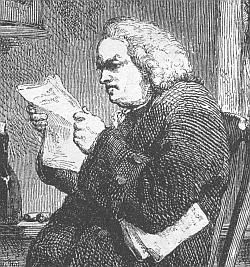 When first I engaged in this work, I resolved to leave neither words nor things unexamined, and pleased myself with a prospect of the hours which I should revel away in feasts of literature, the obscure recesses of northern learning, which I should enter and ransack, the treasures with which I expected every search into those neglected mines to reward my labour, and the triumph with which I should display my acquisitions to mankind. When I had thus enquired into the original of words, I resolved to show likewise my attention to things; to pierce deep into every science, to enquire the nature of every substance of which I inserted the name, to limit every idea by a definition strictly logical, and exhibit every production of art or nature in an accurate description, that my book might be in place of all other dictionaries whether appellative or technical. But these were the dreams of a poet doomed at last to wake a lexicographer. I soon found that it is too late to look for instruments, when the work calls for execution, and that whatever abilities I had brought to my task, with those I must finally perform it. To deliberate whenever I doubted, to enquire whenever I was ignorant, would have protracted the undertaking without end, and, perhaps, without much improvement; for I did not find by my first experiments, that what I had not of my own was easily to be obtained: I saw that one enquiry only gave occasion to another, that book referred to book, that to search was not always to find, and to find was not always to be informed; and that thus to persue perfection, was, like the first inhabitants of Arcadia, to chace the sun, which, when they had reached the hill where he seemed to rest, was still beheld at the same distance from them. When first I engaged in this work, I resolved to leave neither words nor things unexamined, and pleased myself with a prospect of the hours which I should revel away in feasts of literature, the obscure recesses of northern learning, which I should enter and ransack, the treasures with which I expected every search into those neglected mines to reward my labour, and the triumph with which I should display my acquisitions to mankind. When I had thus enquired into the original of words, I resolved to show likewise my attention to things; to pierce deep into every science, to enquire the nature of every substance of which I inserted the name, to limit every idea by a definition strictly logical, and exhibit every production of art or nature in an accurate description, that my book might be in place of all other dictionaries whether appellative or technical. But these were the dreams of a poet doomed at last to wake a lexicographer. I soon found that it is too late to look for instruments, when the work calls for execution, and that whatever abilities I had brought to my task, with those I must finally perform it. To deliberate whenever I doubted, to enquire whenever I was ignorant, would have protracted the undertaking without end, and, perhaps, without much improvement; for I did not find by my first experiments, that what I had not of my own was easily to be obtained: I saw that one enquiry only gave occasion to another, that book referred to book, that to search was not always to find, and to find was not always to be informed; and that thus to persue perfection, was, like the first inhabitants of Arcadia, to chace the sun, which, when they had reached the hill where he seemed to rest, was still beheld at the same distance from them.
I then contracted my design....(more)
_______________________
College Dons on the meadows with their dogs. Classics Professors with their Golden Retrievers. Professors of Mathematics with their Jack Russells. Lecturers in English Literature with dog shelter mongrels, carrying little bags of excrement.
The Cambridge mistake is to think that thought will come when you whistle to it, like a trained dog. But thought must whistle to us, he says. Thought shouldn't be tame. Thought should tear out our throats, he says.
— Wittgenstein Jr
_______________________
How Do Our Brains Process Music?
David Byrne
Excerpted from How Music Works
(....)
As music becomes less of a thing—a cylinder, a cassette, a disc—and more ephemeral, perhaps we will start to assign an increasing value to live performances again. After years of hoarding LPs and CDs, I have to admit I’m now getting rid of them. I occasionally pop a CD into a player, but I’ve pretty much completely converted to listening to MP3s either on my computer or, gulp, my phone! For me, music is becoming dematerialized, a state that is more truthful to its nature, I suspect. Technology has brought us full circle.
(....)
I welcome the liberation of music from the prison of melody, rigid structure and harmony. Why not??But I also listen to music that does adhere to those guidelines. Listening to the Music of the Spheres might be glorious, but I crave a concise song now and then, a narrative or a snapshot more than a whole universe. I can enjoy a movie or read a book in which nothing much happens, but I’m deeply conservative as well—if a song establishes itself within the pop genre, then I listen with certain expectations. I can become bored more easily by a pop song that doesn’t play by its own rules than by a contemporary composition that is repetitive and static. I like a good story and I also like staring at the sea—do I have to choose between the two?...(more)
_______________________
Occupy Your Victories
Occupy Wall Street’s First Anniversary
Rebecca Solnit
(....)
The most startling question anyone asked me last year was, “What is Occupy’s 10-year plan?”
Who takes the long view? Americans have a tendency to think of activism like a slot machine, and if it doesn’t come up three jailed bankers or three clear victories fast, you’ve wasted your quarters. And yet hardly any activists ever define what victory would really look like, so who knows if we’ll ever get there?
Sometimes we do get three clear victories, but because it took a while or because no one was sure what victory consisted of, hardly anyone realizes a celebration is in order, or sometimes even notices. We get more victories than anyone imagines, but they are usually indirect, incomplete, slow to arrive, and situations where our influence can be assumed but not proven -- and yet each of them is worth counting.
(....)
With Occupy, remarkable things have already happened, and more remarkable systemic change could be ahead. Don’t forget that this was a movement that spread to thousands of cities, towns, and even rural outposts across the country and overseas, from Occupy Tucson to Occupy Bangor. Remember that many of the effects of what has already happened are incalculable, and more of what is being accomplished will only be clear further down the road.
Go out into the streets and celebrate the one-year anniversary and start dreaming and planning for 2021, when we could -- if we are steadfast, if we are inclusive, if we keep our eyes on the prize, if we define that prize and recognize progress toward it and remember where we started -- be celebrating something much bigger. It’s a long road to travel, but we can get there from here....(more)
Occupy: one year later
Michael Dean Benton
Occupy Movement (History)extensive linkage assembled by Michael Benton Dialogic
_______________________

photo - mw
_______________________
In My Own Recognizance
Ronald Sukenick
1932 - 2004
ebr
I personally am enamored of the traditional Canon but not interested in repeating it. My ways of avoiding it are through the practice of certain mental gymnastics, or, rarely, through the use of constrictive form as with the Oulipo group whom I consider creative cousins.
Mental gymnastics: ways of blocking the already formulated in pursuing the unformulated.
I try to write in that mental space of 30 seconds where the past claws at the future to produce what we call the present. That helps me get past the premeditated.
Remember the future. That helps me avoid the prefabricated.
(....)
Collage and cutup are ways of interrupting the continuity of the controlling discourse - mosaic is a way of renewing discourse.
Mosaic: new tiles, old fragments, odd scraps - remix. Out of remnants new design. Continuous not discontinuous.
It should be obvious: what's true here and now was not true there and then. But why does that prevent us from trying for truth? Imitate athlete's intelligence operating in a continuous present. Faster than thought.
Grammar of event: event modifying event = further event.
Stupidity can be a virtue. Virtue can be a vice. Artists don't have to be nice.
In the arts evaluation of necessity implies connoisseurship.
Epigrams are half truths. The illuminating half.
...(more)

photo - mw
_______________________
Autumn
William Carlos Williams
A stand of people
by an open
grave underneath
the heavy leaves
celebrates
the cut and fill
for the new road
where
an old man
on his knees
reaps a basket-
ful of
matted grasses for
his goats
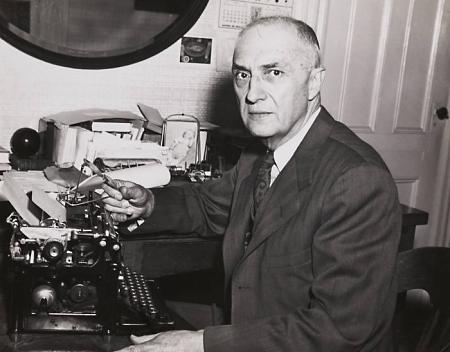
William Carlos Williams
b. September 17, 1883
_______________________
Marx is Back
The Importance of Marxist Theory and Research for Critical Comm. Studies Today
ed C. Fuchs & Vincent Mosco
tripleC
Introduction
Christian Fuchs, Vincent Mosco
The articles in this issue, especially in the variety of topics grounded in Marxist theory and Marx’s works, makes clear that Baudrillard was wrong to claim that “the Marxist theory of production is irredeemable partial, and cannot be generalized” to culture and the media and in also incorrect to insist that “the theory of production (the dialectical chaining of contradictions linked to the development of productive forces) is strictly homogenous with its object – material production - and is non-transferable, as a postulate or theoretical framework, to contents that were never given for it in the first place". Marshall McLuhan was wrong when he argued that Marx and his followers did not “understand the dynamics of the new media of communication”. The special issue of tripleC on “Marx is Back: The Importance of Marxist Theory and Research for Critical Communication Studies Today“ demonstrates the enormous importance of Marx’s theory for Critical Communication Studies today. If one wants to critically study communication and to use that research for social change, then the work of Marx provides an essential building block. Moreover, the articles maintain that to critically examine communication we need to engage with the analysis and critique of capitalism, class, exploitation and with practical struggles for emancipation.
_______________________

photo - mw
_______________________
There’ll be plenty of time
When an acorn grows out of your ear
To accustom yourself to my ways,
To carve yourself a hermit’s toothpick.
—
Charles Simic, out of “Forest” (Dismantling the Silence, 1971)
Hermit
assembled by John Latta
We look at imitation askance; but like the shell which the hermit-crab selects for itself, it has value—the avowed humility, and the protection.
—
Marianne Moore, out of “Archaically New” (1935)
_______________________
Occupy Wall Street/Strike Debt: The Debt Resistors' Operations Manual
_______________________
The Descent
William Carlos Williams
The descent beckons
as the ascent beckoned.
Memory is a kind
of accomplishment,
a sort of renewal
even
an initiation, since the spaces it opens are new places
inhabited by hordes
heretofore unrealized,
of new kinds—
since their movements
are toward new objectives
(even though formerly they were abandoned).
No defeat is made up entirely of defeat—since
the world it opens is always a place
formerly
unsuspected. A
world lost,
a world unsuspected,
beckons to new places
and no whiteness (lost) is so white as the memory
of whiteness .
With evening, love wakens
though its shadows
which are alive by reason
of the sun shining—
grow sleepy now and drop away
from desire .
Love without shadows stirs now
beginning to awaken
as night
advances.
The descent
made up of despairs
and without accomplishment
realizes a new awakening:
which is a reversal
of despair.
For what we cannot accomplish, what
is denied to love,
what we have lost in the anticipation—
a descent follows,
endless and indestructible.
_______________________
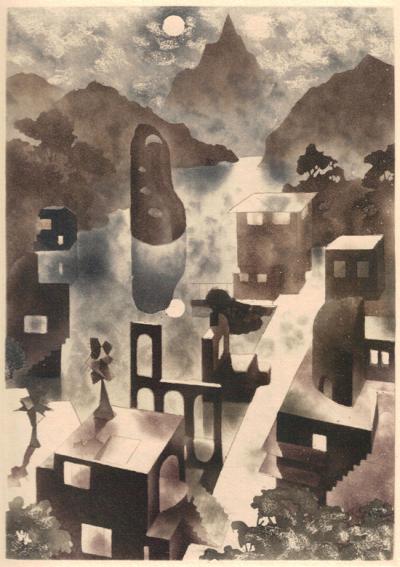
A Voyage to the Island of the Articoles
Alexander Alexeieff's illustrations for Maurois' 1927 book
from the collection of Richard Sica
_______________________
The Trumping Of Politics
Lauren Berlant
(....)
We have heard before this time the reductive and empty debate about the statecraft of lawyers versus the skill of businessmen. What makes it newly powerful, tragic, and dangerous, it seems to me–and I don’t inflate my terms lightly—is the banalization of firing that this puts into place as an affective demonstration of political freedom.
I have argued elsewhere that, under the pressure to justify austerity amidst vast global wealth, democracy has begun to be redefined as the equal exposure of all persons to the virulent excisions of the market. Democracy is no longer imaginatively a counter-force to market forces. A bad employee, throw her out. A clumsy employee who is otherwise a good employee, throw him out. Like a felon, they have lost the right to democracy. This is a world where “right to work” means no right to unionize. This is a world where seeking protections from employer exploitation is recast as being privileged and self-interested. The worker is cast as greedy while the capitalist is cast as generous. In this view, equal vulnerability to swift, efficient, structural judgment is seen to constitute fairness. No matter that austerity is the punishment of the many for the appetites of the few. In this view, exposure to market swings and disturbances equals democracy. We are at the end of Enlightenment liberalism, which is an end that some of us wanted. But the other side also wants it....(more)
_______________________

Children playing by road
John Vachon
c. 1942
(Farm Security Administration/
Office of War Information Collection, Library of Congress)
via Tom Clark
_______________________
Kora in Hell: Improvisations XXVII
William Carlos Williams
(....)
Seeing the leaves dropping from the high and low branches the thought rise: this day of all others is the one chosen, all other days fall away from it on either side and only itself remains in perfect fullness. It is its own summer, of its leaves as they scrape on the smooth ground it must build its perfection. The gross summer of the year is only a halting counterpart of those fiery days of secret triumph which in reality themselves paint the year as if upon a parchment, giving each season a mockery of the warmth or frozenness which is within ourselves. The true seasons blossom or wilt not in fixed order but so that many of them may pass in a few weeks or hours whereas sometimes a whole life passes and the season remains of a piece from one end to the other.
September 16, 2012

Tatlock Calcium & Marble Mine
photo - mw
_______________________
Infinite quest
Jason Cowley
(....)
Wallace was tormented by one defining question: was the world anything more than a tissue of representations? A hard philosophical sceptic, he felt imprisoned inside his own head, his dark box. “There is this existential loneliness in the real world,” he told Laura Miller, the co-founder of Salon.com, in an interview collected in Conversations with David Foster Wallace. “I don’t know what you’re thinking or what it’s like inside you and you don’t know what it’s like inside me.” It was his belief (more a hope, as it turned out) that “in fiction I think we can leap over that wall itself in a certain way”.
But in his life Wallace, who suffered from clinical depression, kept slamming into that wall of separation between the self and the world. He longed to make connections – with other people, with other minds. He longed to understand better, to be free from the tumult and the pain that he felt, every day, without respite.
And yet, for all his suffering, Wallace was a wonderfully exuberant comic writer and ironist. ...(more)
_______________________
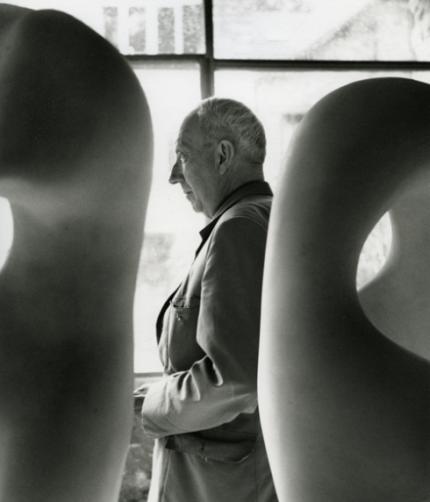
Jean Arp
b. Sept. 16, 1886
photo - Robert Doisneau
_______________________
[2b2k] Truth as meta
David Weinberger
(....)
... truth on the Net needs to be more than the totality of statements that are true. For us to advance as a culture, we need to understand the human involvement in truth. We need to have as a guiding assumption that truth is something we argue about, that it is always seen from a particular historical and cultural position, that is never simply the statement that asserts something true.
And the Net is great at that. Links can lead us back to the processes that led to the assertions on the page, and links can lead us out into a world that interprets and challenges the assertions. Our overall experience of the Web as chaotic informs us that there are lots of different ideas, and, no, they don’t all fit together harmoniously.
If we stick with our old habits on the Net, then not only do we fail to advance, we regress. There are more untruths to learn on the Net than there ever were in the paper world. If we don’t grow into the assumption that truth always has a meta context, we will believe more flat-footed lies.
(....)
One of the definitions of “fundamentalism” of any kind is that it is the assumption that texts speak for themselves, without interpretation or inquiry. Fundamentalism becomes much more dangerous when the seeker of belief has a near infinity of scriptures from which to choose. I believe the Net is making us far smarter, but on cloudy days I wonder....(more)
_______________________

photo - mw
|

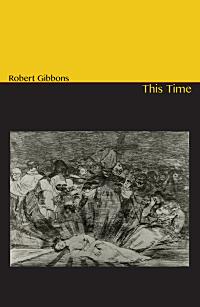
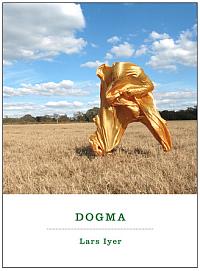







































 When first I engaged in this work, I resolved to leave neither words nor things unexamined, and pleased myself with a prospect of the hours which I should revel away in feasts of literature, the obscure recesses of northern learning, which I should enter and ransack, the treasures with which I expected every search into those neglected mines to reward my labour, and the triumph with which I should display my acquisitions to mankind. When I had thus enquired into the original of words, I resolved to show likewise my attention to things; to pierce deep into every science, to enquire the nature of every substance of which I inserted the name, to limit every idea by a definition strictly logical, and exhibit every production of art or nature in an accurate description, that my book might be in place of all other dictionaries whether appellative or technical. But these were the dreams of a poet doomed at last to wake a lexicographer. I soon found that it is too late to look for instruments, when the work calls for execution, and that whatever abilities I had brought to my task, with those I must finally perform it. To deliberate whenever I doubted, to enquire whenever I was ignorant, would have protracted the undertaking without end, and, perhaps, without much improvement; for I did not find by my first experiments, that what I had not of my own was easily to be obtained: I saw that one enquiry only gave occasion to another, that book referred to book, that to search was not always to find, and to find was not always to be informed; and that thus to persue perfection, was, like the first inhabitants of Arcadia, to chace the sun, which, when they had reached the hill where he seemed to rest, was still beheld at the same distance from them.
When first I engaged in this work, I resolved to leave neither words nor things unexamined, and pleased myself with a prospect of the hours which I should revel away in feasts of literature, the obscure recesses of northern learning, which I should enter and ransack, the treasures with which I expected every search into those neglected mines to reward my labour, and the triumph with which I should display my acquisitions to mankind. When I had thus enquired into the original of words, I resolved to show likewise my attention to things; to pierce deep into every science, to enquire the nature of every substance of which I inserted the name, to limit every idea by a definition strictly logical, and exhibit every production of art or nature in an accurate description, that my book might be in place of all other dictionaries whether appellative or technical. But these were the dreams of a poet doomed at last to wake a lexicographer. I soon found that it is too late to look for instruments, when the work calls for execution, and that whatever abilities I had brought to my task, with those I must finally perform it. To deliberate whenever I doubted, to enquire whenever I was ignorant, would have protracted the undertaking without end, and, perhaps, without much improvement; for I did not find by my first experiments, that what I had not of my own was easily to be obtained: I saw that one enquiry only gave occasion to another, that book referred to book, that to search was not always to find, and to find was not always to be informed; and that thus to persue perfection, was, like the first inhabitants of Arcadia, to chace the sun, which, when they had reached the hill where he seemed to rest, was still beheld at the same distance from them.